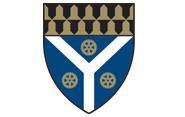SEAS 2014 Graduate Student Prizes Announced

Two Yale School of Engineering & Applied Science doctoral students were honored at the annual Crest & Fest celebration on Wednesday, May 14, 2014.
Visionary Research
Alp Kucukelbir, who graduates this month with a Ph.D. in biomedical engineering, won the Henry Prentiss Becton Graduate Prize, awarded for exceptional achievement in research. His work examines complex mathematical and computational problems that arise when viewing three-dimensional protein structures at movement-reducing cryogenic temperatures—a technique known as electron cryo-microscopy, or cryo-EM. Typically, cryo-EM data is extremely noisy and the process of “resolving” the image—that is separating significant structure from the background noise—is very challenging.

Kucukelbir’s algorithm produces high-quality resolution using only 10% of the data required by other algorithms. This statistically-rigorous approach adjusts the resolution based on locally observed features, then correlates and filters the data using likelihood-ratio tests and a false discovery rate procedure to ensure accuracy. Kucukelbir’s advisor, professor of diagnostic radiology, electrical engineering, & biomedical engineering Hemant Tagare, proclaimed the algorithm the new “standard in the field.”
Kucukelbir has made his work publicly-available as an efficient computer application called ResMap. His work, published last fall in Nature Methods, has been downloaded over a 1,000 times and is already being used by other researchers to settle resolution debates in the published literature. “It is extraordinary for an engineering PhD thesis to have such an impact on science,” said Mark Saltzman, the Goizueta Foundation Professor of Biomedical Engineering, Chemical & Environmental Engineering & Physiology.
After receiving his Ph.D. next week, Kucukelbir will begin a postdoctoral fellowship at Princeton University.
Purposeful Engineering
Leanne Gilbertson, who graduates this month with a Ph.D. in environmental engineering, won the Harding Bliss Prize, awarded to the doctoral student who has done the most to further the intellectual life of the School. Gilbertson, considered a “leader among leaders” even among her peers in the SEAS Advanced Graduate Leadership Program, received the award for both her strong commitment to engineering outreach and her forward-thinking research.

Gilbertson’s key outreach project during her AGLP fellowship was founding a program to interest young women in engineering and science. After an enthusiastic response from students and teachers alike, she partnered with Yale’s Office of New Haven and State Affairs to institutionalize the program as an annual daylong “Pathways to Engineering” visit to Yale Engineering for top students in the New Haven public school system.
Gilbertson continued to expand the Pathways program throughout her tenure as a doctoral student, including the development of planning and training materials that ensure the program’s future success. As well, she has used her experience with the program to help shape the ALGP program itself with new ideas and initiatives.
In addition to her outreach, Gilbertson’s research examined the cytotoxic properties of carbon nanotubes and their effects on the environment, resulting in a model other investigators can use to understand the health implications of carbon nanotubes during the design, manufacturing, and utilization phases of commercial products. Her advisor, Julie Zimmerman, the Donna L. Dubinsky Associate Professor of Chemical & Environmental Engineering & Forestry & Environmental Studies, applauded Gilbertson’s ability to “translate her research into useful information for policy makers. She has communicated her findings in a way that can drive government strategies to protect human health and the environment.”
After graduation, Gilbertson will continue at SEAS with a postdoctoral fellowship in chemical engineering.

